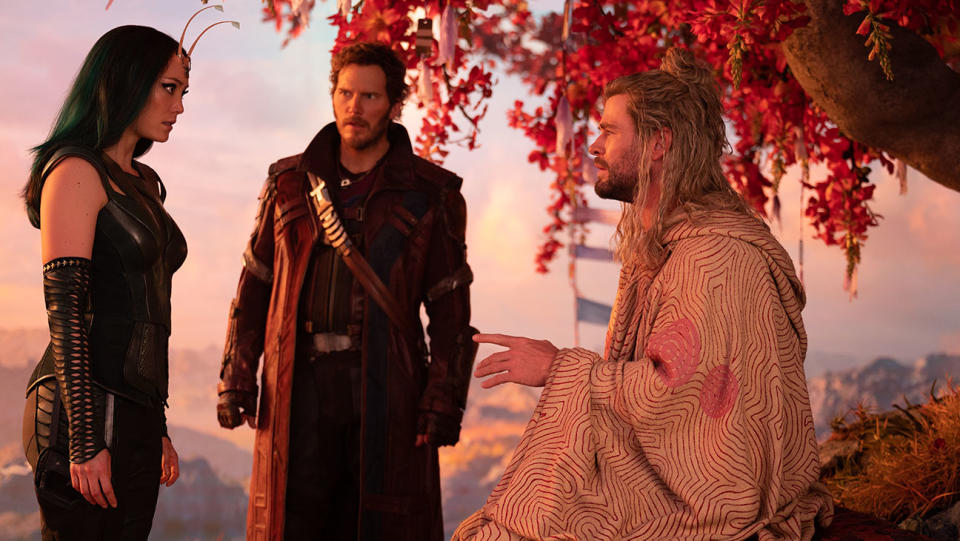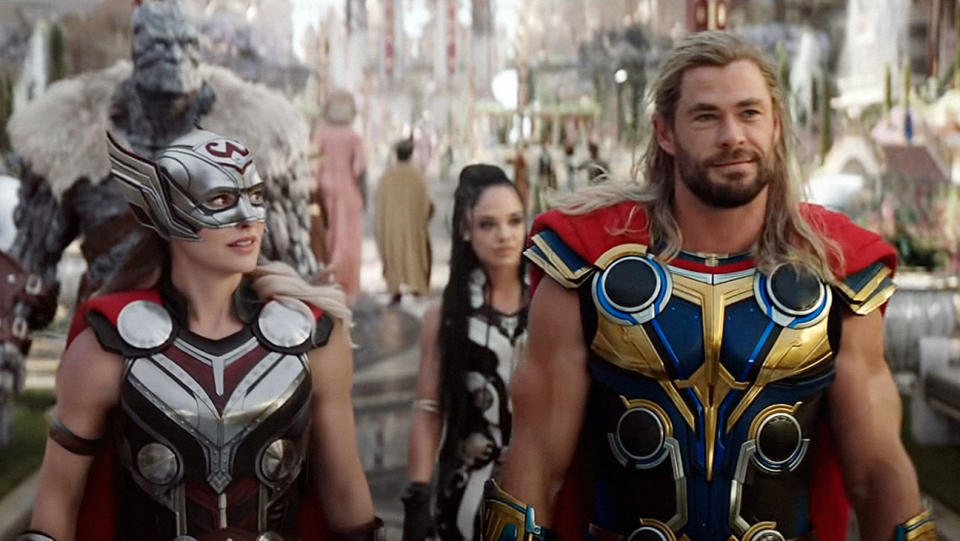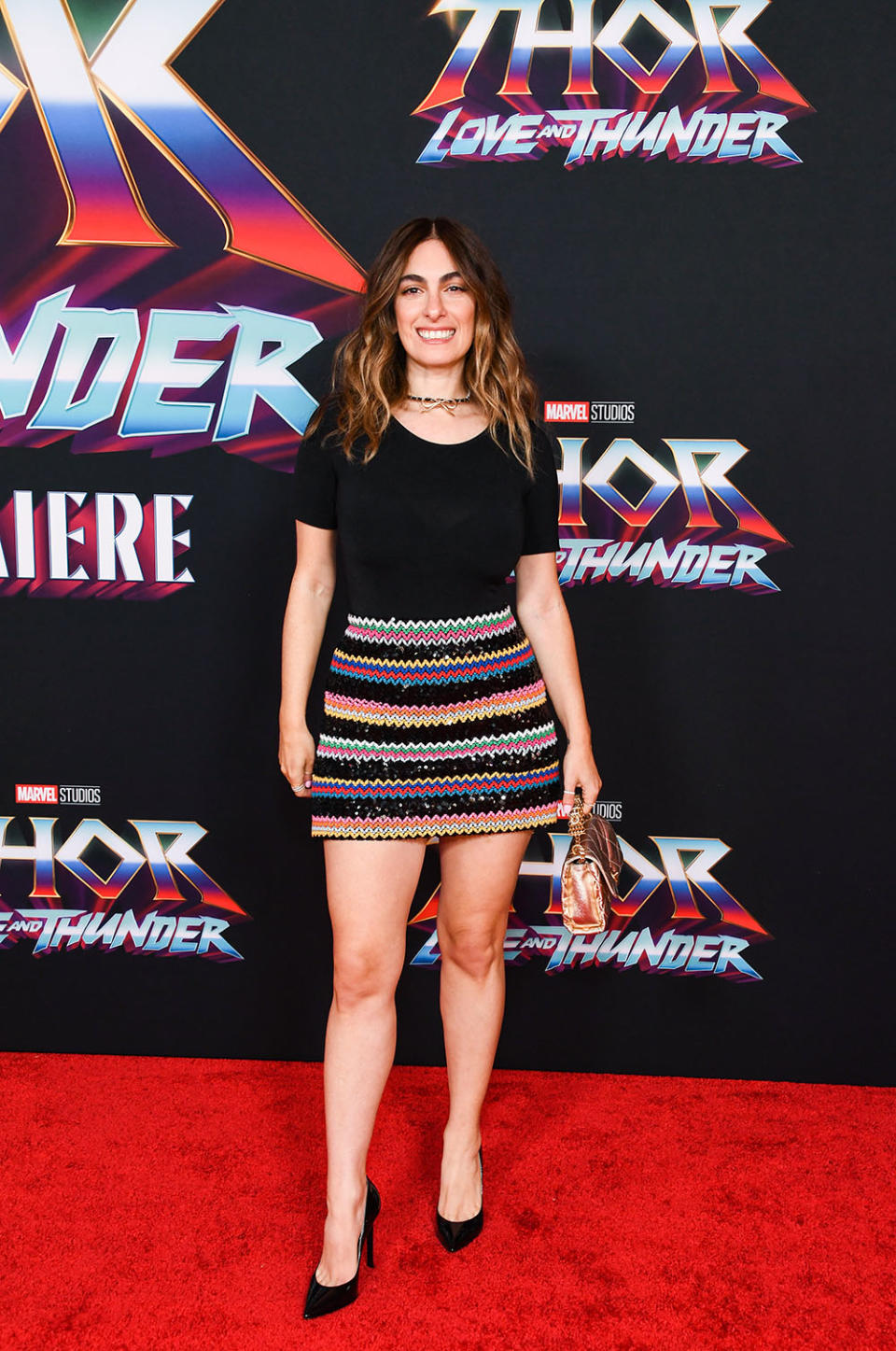‘Thor: Love and Thunder’ Co-Writer Jennifer Kaytin Robinson Talks Cracking the Ending and the Key Scene Found in Additional Photography

[This story contains spoilers for Thor: Love and Thunder.]
For screenwriter Jennifer Kaytin Robinson, landing Thor: Love and Thunder was the good news in a good news/bad news conversation.
More from The Hollywood Reporter
When she booked the job, she had already been in contention to write several Marvel Studios projects, including Black Widow and Hawkeye. In February 2020, she learned that while she hadn’t landed her latest pitch on Captain Marvel II, she’d be teaming with filmmaker Taika Waititi for Love and Thunder, a film she never even pitched for.
After spending a month writing at Marvel’s Burbank headquarters, Robinson — like the rest of the world — was sent home as the coronavirus pandemic spread. Eventually she headed to Australia, where she ran around set with a laptop, reworking scenes on the fly as part of Waititi’s fluid creative process.
The film included a pivotal scene in which Gorr (Christian Bale) opts to bring his daughter, Love (India Rose Hemsworth) back to life rather than continue to seek revenge on the gods he blames for the universe’s pain.
“There were many different versions of that final scene,” Robinson tells The Hollywood Reporter, noting in some iterations they wrote, Gorr tries to seek revenge, but instead Love is brought back because that’s what he wants in his heart.
The screenwriter also reveals that the signature rom-com montage exploring the deterioration of Thor (Chris Hemsworth) and Jane Foster’s (Natalie Portman) relationship was an idea Waititi put together in additional photography.
Robinson, who also directed the upcoming Netflix film Do Revenge, also spoke to THR about the “summer camp” vibe of shooting with the Guardians of the Galaxy cast, and reveals Tom Hiddleston’s Loki was not on the table to return.
How did you shape the villain Gorr for Christian Bale?
We did a lot of work as a group. [Producer] Brad Winderbaum, Taika and myself — really trying to find the right tone, where he can fit in a Taika world and be fun, but he’s also a formidable villain. His story is tragic, and you really want to make sure you don’t trivialize that and make it seem funny. You also want to give Christian moments where he can play within the worlds Taika creates. It doesn’t have to be this downer villain, which was very important to Christian as well.
I enjoyed the prologue, which was bleak. And then the end of the prologue you have this god who is such a …
An asshole!
An asshole. It surprised me that after seeing Gorr’s daughter pass away that I was laughing a few minutes later.
That’s the magic of Taika. That encapsulates everything that Taika does well and what he is able to create and put on screen in a way he can accomplish. He is singular in that way.

You and Taika got to introduce canon to James Gunn’s Guardians of the Galaxy world. For instance, Peter Quill (Chris Pratt) is missing Gamora (Zoe Saldana) and not doing great. How much thought goes into treading into that territory?
I am a superfan of the MCU so there was something really insane about writing dialogue for these characters that I loved. It was striking a balance between coming to this as a true fan and someone who has reverence for the MCU and all of these characters. For Taika and I to be able to say, “What are the parallels for these characters? What has James Gunn created? What has Taika created? Where do the parallels lie?” and how to bring that out and use that to tap into the emotionality of this story. Looking at all that Thor has lost and all that Quill has lost, there is a lot of overlap there. It felt like a natural place to have Quill be this voice in Thor’s head that can push him toward his arc for the movie.
Hemsworth and Pratt have a lot of charm together in those scenes. What were those days on set like?
It was the first two weeks of shooting, so we got to hit the ground running, starting chronologically in the beginning of the film for Thor. It was such a fun way to start shooting this movie, to have all of those actors there. It was like two weeks of summer camp with the Guardians.
After Dark World, I wondered what happened between Thor and Jane. How did you and Taika work that out? I’m sure much of that rom-com montage came together in the editing.
That was all Taika. That was something Taika conceived of in additional photography and they shot after they shot principal. There was definitely a lot of back and forth on what happened. What do we want to show? It was not just conversations with Taika, but conversations with Chris and Natalie. Really trying to flesh out, “How much do we want to show? How much of it is ex-girlfriend vs. Mighty Thor?” Really trying to find the balance across the board of what is Jane’s story and what should be the focus? Something that came to the surface was wanting to know more about the past of that relationship.
I loved the jealousy between Thor’s weapons, Stormbreaker and Mjölnir. What do you remember about crafting that?
In Taika’s first draft, Stormbreaker had kind of a personality. It was running at that and finding exciting ways everywhere we could to pepper in that jealous new love looking at the old love. It is a love triangle. You have the Thor and Jane love story, and then you have the love triangle of Mjölnir and Stormbreaker. Honestly, I ‘ship it. I love it.

There’s a nice moment where Thor and Valkyre get to commiserate a bit about Jane, who is the new kid on the block as a Thor. Was it important that everyone gets a chance to have those moments?
All of it is so in the ethos in the Taika Waititi school of screenwriting and really wanting it to feel inclusive across the board and for every character to be able to shine and subvert it in unexpected ways. There are moments where Val and Jane look at Thor, especially when he blasts out of the town hall and walks back in. “What are you doing?” And later, for Jane to have those moments. It’s about giving each character a space to shine comedically without making that character the butt of the joke. That is what Taika does so well. Being able to create a space where everyone feels like they can laugh at each other, but it’s never malicious. It’s never meanspirited.
How much did you work on Jane’s catchphrases?
We had a script and every day it’d be like, “throw it out. Let’s rewrite it. Let’s rewrite it again.” It was a lot of me running around with a laptop and typing things down and listening. “Does this work?” Carrying a computer around and being like, “I think I wrote what you guys wanted?” It was a very, very expensive run and gun indie film. It’s not about Taika throwing things out, but everyone collaborating together and really getting it up on its feet and everyone having a voice.
How does Russell Crowe boarding as Zeus change the calculus for you?
He is a legend. He is cast, and then everything clicks into place and then you really get to write towards the strengths of this legend. You think, who is a God that Thor reveres? Thor is the strongest Avenger. He is the coolest guy. How do you create someone larger than Thor, someone even Thor is like, “Oh my God.” And obviously ripping that all away as he is — again — an asshole. (Laughs.) And wanting to find that balance of you love to hate Zeus.
Idris Elba is back briefly. Did you toy with having Tom Hidldeston pop up? Or was that not on the table?
Never on the table from what I understand. He’s in Loki-land. He’s doing his own thing. They are on two separate journeys.
How early did you settle on the ending, with bringing back Gorr’s daughter, Love?
Love and Thunder was always Love and Thunder. Gorr was always going to bring his daughter back into existence. There were many different versions of that final scene. There were many different versions of, “Does Gorr always make the choice? Does his heart kind of betray him? Does he go to the very last minute, “No I want the gods to die,” but because Eternity grants your deepest desire, it’s his daughter that’s brought back? There were a lot of different versions of how she came into being, but her coming into being and that being what is brought forward from Eternity was always the end goal.
Were you on set for the post-credit scene with Brett Goldstein as Hercules?
No, that was a top-secret situation I did not know about, and I was surprised to see at the premiere. It’s fun to come to this movie where I knew all the twists and turns, but could still walk out of it being like, “holy shit!”

You also write and direct original ideas rather than IP. Are you more focused on those goiing forward, or are you hoping to return to Marvel in the future?
I left Thor and wrote and directed my own movie called Do Revenge, which is out this fall on Netflix. I’m very much “where does the wind blow me?” I am excited to take time and figure out what I want to do next. I Love writing big movies. I love writing small movies. I love making movies.
Did you bring any of Thor to your directing?
100 percent. I had already directed. This was my second movie. I was able to learn so much from Taika on set and I took so much of that with me. You also take the ability to be nimble and adapt. To take that skillset and apply it to something I had full control of was really excellent. Things go wrong on big movies, on small movies all the time. This movie that I was shooting after Thor stars Maya Hawke, and Maya Hawke was also shooting Stranger Things. So every day was an adventure shooting that movie, and rewriting and changing. [Sometimes] she was stuck on Stranger Things and couldn’t come to us. I took the things I learned watching Taika and working together on Thor I was able to drop that in like plug and play on Do Revenge. It’s about teen girls doing revenge. It’s this subverted, Strangers on a Train, high school wacky, camp situation. I was able to take Taika’s ethos of dumping all the toys in the toy chest out and being like, “We’re going to use all of it and have it fit together” and being able to implement that on my film, which was not something you would think you would use Marvel storytelling for. So it really all goes hand-in-hand in the most unexpected ways.
Best of The Hollywood Reporter


